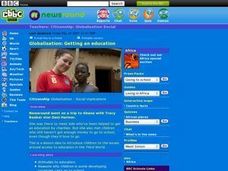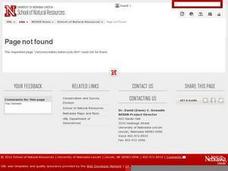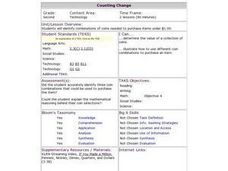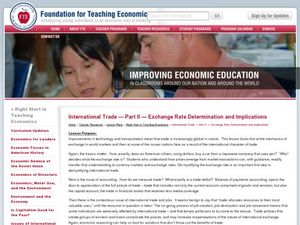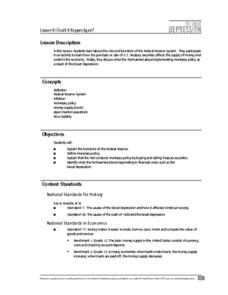Curated OER
Give Me Five, Cents That Is
Students explore coins, especially the nickel, through a toy cash register, worksheet, and paper nickels.
Curated OER
VAROOOOOOMMMMMMMMMMMM!!!!!!!!!!!!!
Students simulate purchasing a car. They use various search engines on the Internet to research the car purchase. Students investigate types of cars, trade in value, insurance costs, interest rates and monthly costs.
Curated OER
Introduction To Earning Interest
Students engage in a lesson on interest and bank savings accounts. They see why people deposit money at banks and other financial institutions and explain that interest is paid on an annual, monthly or quarterly basis.
Curated OER
The Tudor Marketplace: Information Sheet
In this worksheet about the Tudor marketplace, students read about the people who attended, items sold and the money system of the marketplace.
Curated OER
Active Citizenship through the Spectacles of Benjamin Franklin
Young scholars research and identify ways that Benjamin Franklin contributed to society. They identify the core democratic values and how he achieved them. They research organizations in their area that give back to the community.
Curated OER
Contentment
Students examine what brings contentment. They read and discuss a story about success and contentment. After singing a song, students discuss the values related to peace and complete worksheets. Students write values related to peace...
Curated OER
High School Mathematics Problems from Alaska:Cutting Cordwood
Students solve problems and answer questions about two young men attemtping to earn money by cutting cords of wood.
Curated OER
Bridges: Local, National and Global Connections
Fifth graders examine the role of bridges in commerce and transportation. They create a schedule for building a bridge and how much money it would take to build one.
Curated OER
Globalisation: Getting an education
Students are reading the story about Dani Harmer. In pairs they write down five things they know about life in Africa. They then are asked why do they think Dani Harmer wants to draw students's attention to the value of education? ...
Curated OER
Aluminum Altruism
Students explore the value of recycling. They consider the importance of giving back to their school community. They calculate their earnings using multiplication and addition.
Curated OER
Determining Mercantile Volume of a Pine Tree
Fourth graders, acting as foresters, determine timber volumes as sawtimber or pulpwood for marketing. They find the marketable value of a tree using its diameter and volume.
Curated OER
Mineral Munch
Second graders explore the sodium content in foods they eat. After observing a table setting, 2nd graders then identify items made from rock. They taste low sodium crackers and compare them to regular crackers. Students discuss the...
Curated OER
Decimals: Worksheet 2
In this decimal activity, students solve a total of 31 decimal problems including: writing decimals, determining the smaller of 3 decimals, determining place value, rounding, filling in missing numbers and word problems.
Curated OER
Whole Numbers: Worksheet 2
For this whole number worksheet, students write numbers in words, write word phrases in numbers, determine place value, fill in missing numbers, round, estimate, and place numbers in ascending order.
Curated OER
Using Multiplication to Solve Word Problems
Students explore math functions by solving word problems in class. In this multiplication lesson plan, students utilize colored cubes and base blocks to visualize multiplication problems. Students identify the multiplication values...
Curated OER
You're the Cashier!
Third graders use manipulatives and computers to count back change from amounts up to $5.00.
Curated OER
South Dakota Quarter Reverse: Four Famous Faces
Students recognize the faces of the four presidents on the South Dakota quarter reverse. After discussing the duties and responsibilities of presidents, they list the contributions of the four presidents. They decide which presidents are...
Curated OER
Math/Technology: Coin Combos
Second graders identify coin combinations needed to purchase items under a dollar. Using Kidspiration, they demonstrate three ways to purchase a pizza slice for 96 cents and choose an item which cost less than a dollar for other to...
Curated OER
Math Lesson: Just How Many is a "Million Dead"?
High schoolers are able to convert large numbers into meaningful ratios. They are able to conceptualize 1 million. Students grapple with the concept of a million. They use this activity to convey the idea of millions by converting war...
Curated OER
The Federal Reserve
Students explore the role of government in the economy market. For this economics lesson, students analyze the decision making and how it takes into consideration additional cost, benefits and public awareness of what they are trying to...
Curated OER
Japan's Economic Miracle
Learners explore the concepts of price and demand. In groups, pupils simulate the purchase and selling of land in Japan. They create a loan, and make decisions to buy or sell as the economic market fluctuates. Classmates discuss their...
Curated OER
Market Structures and Competition
Students explore the role of government in the economy market. In this economics lesson, students analyze the decision making and how it takes into consideration additional cost, benefits and public awareness of what they are trying to...
Federal Reserve Bank
Could It Happen Again?
The final instructional activity in a series of six about the Great Depression focuses on the Federal Reserve's role in stabilizing the economy.
Curated OER
What Makes The Good Life
What makes a good life? What makes life hard? Get your class thinking about the global picture with this extensive packet. They read quotes from around the world, analyze statistical data from every continent, then read and answer...
Other popular searches
- Money Place Values Chart
- Money Place Values 4th
- Comparing Money Values
- Rounding Off Money Values
- Money Values Chart
- Compare Money Values
- Money Values Paper Currency
- 152 Compare Money Values
- 15.2 Compare Money Values










